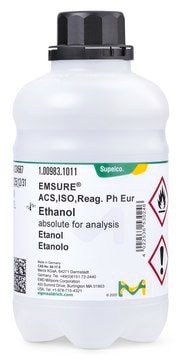E7148
Ethyl alcohol, Pure
≥95.0%, for molecular biology, 190 proof
Synonym(s):
Ethanol, absolute alcohol, non-denatured ethanol
About This Item
Recommended Products
product name
Ethyl alcohol, Pure, 190 proof, for molecular biology
vapor density
1.59 (vs air)
Quality Level
type
for molecular biology
Assay
≥95.0%
form
liquid
expl. lim.
3.1-27.7 %
greener alternative product characteristics
Safer Solvents and Auxiliaries
Use of Renewable Feedstocks
Learn more about the Principles of Green Chemistry.
sustainability
Greener Alternative Product
concentration
190 proof
pH
7.0 (20 °C, 10 g/L)
bp
78.3 °C
mp
-114 °C
density
0.816 g/mL at 25 °C
greener alternative category
, Aligned
InChI
1S/C2H6O/c1-2-3/h3H,2H2,1H3
InChI key
LFQSCWFLJHTTHZ-UHFFFAOYSA-N
Looking for similar products? Visit Product Comparison Guide
General description
Application
- The precipitation and purification of nucleic acids and proteins.
- Histology to prepare staining and destaining reagents. Dehydrating tissues prior to embedding.
Other Notes
Signal Word
Danger
Hazard Statements
Precautionary Statements
Hazard Classifications
Eye Irrit. 2 - Flam. Liq. 2
Storage Class Code
3 - Flammable liquids
WGK
WGK 1
Flash Point(F)
55.4 °F - closed cup
Flash Point(C)
13 °C - closed cup
Certificates of Analysis (COA)
Search for Certificates of Analysis (COA) by entering the products Lot/Batch Number. Lot and Batch Numbers can be found on a product’s label following the words ‘Lot’ or ‘Batch’.
Already Own This Product?
Find documentation for the products that you have recently purchased in the Document Library.
Customers Also Viewed
Our team of scientists has experience in all areas of research including Life Science, Material Science, Chemical Synthesis, Chromatography, Analytical and many others.
Contact Technical Service




